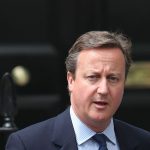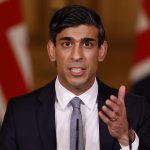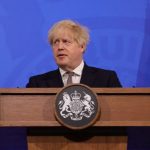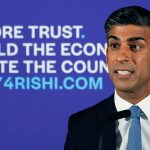Rishi Sunak looks set to weaken key climate pledges in a move that has drawn heavy criticism from Tory MPs and environmental groups.
The prime minister said he remains committed to the net zero target by 2050 but will achieve it “in a better, more proportionate way”.
It comes after a BBC report said as part of a major policy shift, the PM could weaken the plan to phase out gas boilers from 2035 and delay the ban on the sale of new petrol and diesel cars – currently due in 2030 – by five years.
It sparked anger among Tory MPs, with one telling Sky News they are “seriously considering” a no confidence letter.
Politics latest: What is 2030 petrol car ban – and could it be postponed?
However, in a statement on Tuesday night, Mr Sunak said: “No leak will stop me beginning the process of telling the country how and why we need to change.
“As a first step, I’ll be giving a speech this week to set out an important long-term decision we need to make so our country becomes the place I know we all want it to be for our children.”
Targets designed to drive net zero look like they’re about to be softened
Campaigners raise concerns over ‘cosy’ relationship between UK’s oil regulator and fossil fuel industry
UK installs record number of heat pumps and solar panels
Giving a flavour of what is to come, the prime minister added: “I know people are frustrated with politics and want real change.
“Our political system rewards short-term decision-making that is holding our country back.
“For too many years politicians in governments of all stripes have not been honest about costs and trade offs. Instead they have taken the easy way out, saying we can have it all.”
Mr Sunak insisted that realism “doesn’t mean losing our ambition or abandoning our commitments – far from it”.
He said: “I am proud that Britain is leading the world on climate change. We are committed to net zero by 2050 and the agreements we have made internationally – but doing so in a better, more proportionate way.
“Our politics must again put the long-term interests of our country before the short-term political needs of the moment.”
Analysis: Targets designed to drive net zero set to be softened
Mr Sunak has previously hinted he is prepared to water down climate policies that add extra costs and “hassle” to households.
It came after the Tories’ unexpected victory at the Uxbridge by-election, which was credited to their opposition to the ULEZ congestion zone charge scheme.
Since then some Tory MPs have argued the party should drop green policies that could impose costs on consumers to gain votes at the ballot box.
But others are concerned it will damage the UK’s reputation on climate change.
Tory MPs are particularly angry about the reported change to the car policy, with one calling it “anti-business” – given how much the car industry has invested in Electric Vehicles (EV).
They told Sky’s deputy political editor Sam Coates that a push back on the petrol and diesel ban would mean breaking a promise the prime minister made to Conservative MPs privately.
Separately, one minister said they would be “staggered” if the car ban is delayed because of the signals it sends to industry, telling Sky News: “Every automotive company is investing in EV, we’ve just given Tata all this money to make batteries, it’s bonkers.”
Some senior Tory figures voiced their concern publicly, with former Cop26 president Sir Alok Sharma warning that “for any party to resile from this (climate action) agenda will not help economically or electorally”,
Tory former Cabinet minister Sir Simon Clarke tweeted that “it is in our environmental, economic, moral and (yes) political interests as @Conservatives to make sure we lead on this issue rather than disown it”.
There was also anger from opposition MPs and climate groups.
Labour’s shadow energy secretary Ed Miliband said: “This is a complete farce from a Tory government that literally does not know what they are doing day to day.
“Thirteen years of failed energy policy has led to an energy bills crisis, weakened our energy security, lost jobs, and failed on the climate crisis.”






















